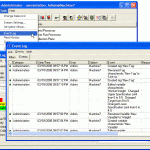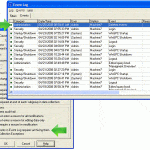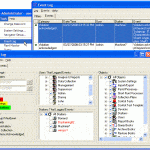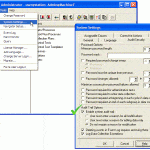Surgery Equipment Manufacturer Uses WinSPC to Deliver Precision Surgical Instruments
Medical Equipment and Device Manufacturer Selects WinSPC Real-Time Quality Control Software
Powersports Equipment Manufacturer Implements WinSPC Real-Time SPC Software
How To Digitize Your End-To-End Food & Beverage Supply Chain
Supply chain constraints, changing consumer preferences, traceability requirements, new government regulations, and the national labor shortage have had significant impacts on the food and beverage supply chain. To address roadblocks, smart companies are investing in technology that helps them do more with less, address current disruptions, and plan for the future. Working with Advantive … Continued
SPC & WinSPC Software Courses

Virtual Classroom – WinSPC Administrator Course (4 days)
Gain the experience of the in-person WinSPC Administrator course with the convenience of remote learning.
The essential course for quality team members who require broad WinSPC competency, particularly a quality team’s designated WinSPC administrator(s). (This course is not required for shop-floor personnel who will just use WinSPC to capture data.)
The Virtual Classroom version of the WinSPC Administrator Course delivers the full WinSPC Administrator curriculum in a formalized online environment. The class replicates the structured experience of in-person training using the same content, including attendance by multiple customers. Each attendee will access a pre-configured virtual WinSPC environment through a web browser — access to this environment is only available during the training class session. Attendees will interact with the instructor and other attendees through an online meeting platform (GoToMeeting). Those with two monitors will be able to watch the instructor and manage their own session side-by-side, each given a full screen.
Dates Offered:
| Month | Date | Class | Trainer | Location |
| January | 1/8/2024 | WinSPC Admin Training | Virtual | |
| February | 2/5/2024 | WinSPC Admin Training | Virtual | |
| March | 3/4/2024 | WinSPC Admin Training | Virtual | |
| April | 4/1/2024 | WinSPC Admin Training | Virtual | |
| May | 5/6/2024 | WinSPC Admin Training | Virtual | |
| June | 6/3/2024 | WinSPC Admin Training | Virtual | |
| July | 7/1/2024 | WinSPC Admin Training | Virtual | |
| August | 8/5/2024 | WinSPC Admin Training | Virtual | |
| September | 9/2/2024 | WinSPC Admin Training | Virtual | |
| November | 11/4/2024 | WinSPC Admin Training | Virtual | |
| December | 12/2/2024 | WinSPC Admin Training | Virtual |
Delivery Methods and Cost:
- Delivered virtually in a browser using Cloudshare training technology accessed with GoToMeeting
- Cost is $1500/seat
- Contact your account representative to transfer your existing in-person training credits to virtual seats
Technical Requirements:
- A computer with a modern browser such as Chrome
- An internet connection of at least 5Mbps
- The ability to access remote Cloudshare and GoToMeeting network servers from your network
- The ability to install the GoToMeeting javascript or remote access client components for your chosen platform
- Recommended – Two monitors for viewing and comparing the instructor WinSPC and your WinSPC session simultaneously
Additional Technical Resources
- The GoToMeeting attendee technical requirements for desktops and mobile clients can be found here.
- To test/attempt a GoToMeeting installation on your current device and browser click here.
- To run the CloudShare Connectivity and Speed Test on your current machine click here.
- For tips on improving your browser performance while training click here
Typical Daily Course Schedule
- 9:00 am – 12:00 pm — Morning Session (includes several 5-10min breaks)
- 12:00 pm – 12:30 pm — Lunch break
- 12:30 pm – 3:00 pm — Afternoon Session (includes several 5-10min breaks)
- 3:00 pm – 3:30 pm — Q&A Period
Topics Covered in This Course:
- Creating and setting up parts, variables, attributes, tags, and collection plans
- Capturing data from external sources
- Capturing data manually (via keyboard)
- Using control tests and real-time alarms (triggers)
- Monitoring processes in real-time
- Working with dashboards
- Analyzing data
- Working with data sets and data filters
- Generating reports
- Performing core administrative tasks (user setup, password management, etc.)
- Setting up the Cost Inspector to expose the cost of variation and the cost of process offset
- Customizing charts using chart schemes
- And more…
Virtual Classroom – Customer-Specified Content
An offering that allows customers to select from a menu of topics. Commonly, the topics selected are ones covered in earlier courses (WinSPC Administrator, SPC Fundamentals, Custom Web Reporter, QualTrend) taken to a deeper customer specific level of detail.
Contact your Services representative to design the course you need.
Delivery Methods and Cost:
- Virtual Classroom: $1200/6-hour block
In-Person Classroom – SPC Fundamentals (1 day)
A survey of basic statistical process control concepts. This course is designed to help WinSPC users maximize the value they get from WinSPC by introducing them to the core SPC principles that WinSPC is based on.
Dates Offered in the Southfield (MI) training center:
| Month | Date | Class | Trainer | Location |
| January | 1/8/2024 | WinSPC Admin Training | Virtual | |
| February | 2/5/2024 | WinSPC Admin Training | Virtual | |
| March | 3/4/2024 | WinSPC Admin Training | Virtual | |
| April | 4/1/2024 | WinSPC Admin Training | Virtual | |
| May | 5/6/2024 | WinSPC Admin Training | Virtual | |
| June | 6/3/2024 | WinSPC Admin Training | Virtual | |
| July | 7/1/2024 | WinSPC Admin Training | Virtual | |
| August | 8/5/2024 | WinSPC Admin Training | Virtual | |
| September | 9/2/2024 | WinSPC Admin Training | Virtual | |
| November | 11/4/2024 | WinSPC Admin Training | Virtual | |
| December | 12/2/2024 | WinSPC Admin Training | Virtual |
Delivery Methods and Cost:
- Come to Our Classroom: $750/student
- We go to Your Classroom: $2000/instructor day, plus lodging and per diem (maximum number of students: 10)
Topics Covered:
- Overview of SPC
- SPC check sheets
- Pareto charts
- Cause-and-Effect diagrams
- Control charts
- Histograms
- Process capability indexes
- Scatter diagrams
In-Person Classroom – WinSPC Administrator (4 days)
The essential course for quality team members who require broad WinSPC competency, particularly a quality team’s designated WinSPC administrator(s). (This course is not required for shop-floor personnel who will just use WinSPC to capture data.)
Dates Offered in the Southfield (MI) training center:
| Month | Date | Class | Trainer | Location |
| January | 1/8/2024 | WinSPC Admin Training | Virtual | |
| February | 2/5/2024 | WinSPC Admin Training | Virtual | |
| March | 3/4/2024 | WinSPC Admin Training | Virtual | |
| April | 4/1/2024 | WinSPC Admin Training | Virtual | |
| May | 5/6/2024 | WinSPC Admin Training | Virtual | |
| June | 6/3/2024 | WinSPC Admin Training | Virtual | |
| July | 7/1/2024 | WinSPC Admin Training | Virtual | |
| August | 8/5/2024 | WinSPC Admin Training | Virtual | |
| September | 9/2/2024 | WinSPC Admin Training | Virtual | |
| November | 11/4/2024 | WinSPC Admin Training | Virtual | |
| December | 12/2/2024 | WinSPC Admin Training | Virtual |
Delivery Methods and Cost:
- In Our Classroom: $1500/student
- At Your location: $2000/instructor day, plus lodging and per diem (maximum number of students: 10)
Topics Covered:
- Creating and setting up parts, variables, attributes, tags, and collection plans
- Capturing data from external sources
- Capturing data manually (via keyboard)
- Using control tests and real-time alarms (triggers)
- Monitoring processes in real-time
- Working with dashboards
- Analyzing data
- Working with data sets and data filters
- Generating reports
- Performing core administrative tasks (user setup, password management, etc.)
- Setting up the Cost Inspector to expose the cost of variation and the cost of process offset
- Customizing charts using chart schemes
- And more…
Recorded Training – SPC Fundamentals (3 hours)
This course, which is free and can be viewed online, is designed to help WinSPC users maximize the value they get from WinSPC. It aims to do this by introducing them to the core SPC principles that WinSPC is based on. Together with the accompanying training guide, it is expected to be both a cost-effective refresher for SPC practitioners and an efficient way to introduce new team members to basic SPC concepts.
Fundamentals section. For additional help with SPC, please visit our SPC Training Materials page.
Topics Covered:
- Overview of SPC
- SPC check sheets
- Pareto charts
- Cause-and-Effect diagrams
- Control charts
- Histograms
- Process capability indexes
- Scatter diagrams
Recorded Training – WinSPC Basics (5.5 hours)
A no-frills video and audio recording of the basics of WinSPC. It is intended primarily as a refresher for previously trained students or as a stop-gap to get new WinSPC users up-to-speed on a small number of WinSPC features. It is not meant to be a substitute for the WinSPC Administrator classroom course discussed above. The recording can be viewed by an unlimited number of users at the customer site.
Delivery Methods and Cost:
- Recorded Training: DVD or downloadable file: $500/customer site
Topics Covered:
- WinSPC Environment and Licensing
- Creating Your First Part
- Creating a Variable
- Attributes and Tags
- Collection Plans
- Using Serial Devices to Collect Data
- Collecting Data from Excel
- Control Tests
- Triggers
- The Message Box Trigger
- Lists
- Plant Monitor
- Variable Analyzer
- Data Sets
- Reporting
- Users and Stations
- More Administration
Advanced Consulting – Integral Concepts
Integral Concepts delivers advanced training on a number of Quality topics.
- Statistical Process Control and Process Capability: The objective of this 3-day course curriculum is to provide participants with the analytical tools and methods necessary to: understand SPC fundamentals and the importance of reducing variation; implement control charting in order to assess process stability; interpret control chart signals and implement appropriate reaction plans; determine appropriate sampling plans and sample sizes; assess process capability (for normal and non-normal data); apply charting techniques for short production runs; apply charting methods where multiple sources of variation may exist (e.g., multiple cavities, filling heads); apply SPC for naturally trending data (e.g. due to tool wear); determine the appropriate type of chart for a given process; and avoid common misapplications of SPC in practice.
- Design of Experiments: This 4-day course teaches participants how to plan and conduct experiments in an effective and efficient manner. Participants gain a solid understanding of important concepts and methods to develop predictive models that allow the optimization of product designs or manufacturing processes. Practical examples are presented to illustrate the application of technical concepts. Participants get a chance to design an experiment, analyze the results, and utilize the model(s) to develop optimal solutions.
- Reliability/Weibull Analysis: The objective of this 3-day course is to train participants to: understand reliability concepts and unique aspects of reliability data; understand underlying probability and statistical concepts for reliability analysis; develop competency in the modeling and analysis of time-to-failure data; understand reliability metrics and how to estimate and report them; handle multiple failure modes; estimate reliability of subsystems and systems; become aware of system reliability activities such as Reliability Block diagramming, Reliability importance, and Reliability allocation; determine if reliability specifications are met (at specified confidence level) or whether design improvements are required; develop competency in the planning of reliability tests (sample sizes); develop reliability demonstration test plans (testing time vs. number of units tradeoffs); and analyze existing warranty data to predict future returns.
- Statistics, Hypothesis Testing, and Regression: The objective of this 3-day course is to provide participants with the analytical tools and methods necessary to: describe and summarize data effectively with descriptive statistics and graphical methods; correctly compare groups with respect to means, variability, and proportions by testing hypotheses; estimate key statistics and quantify uncertainty (confidence intervals); characterize expected variation from sample data (tolerance intervals); determine appropriate sample sizes to achieve adequate power for hypothesis tests; and develop, validate, and utilize predictive models. Many practical examples are presented to illustrate the application of technical concepts.
- Measurement Systems Assessment: This 2-day course’s purpose is to provide participants with the analytical tools and methods necessary to: understand key sources of measurement error; design and conduct Gage R&R studies to estimate measurement error components (repeatability, reproducibility); interpret Gage R&R results and identify corrective actions if necessary; plan and conduct Gage R&R studies for attribute systems; apply control charts to monitor measurement systems over time; assess accuracy and linearity of measurement systems; and handle non-replicable systems (such as destructive tests).
For more information on these courses, including their delivery methods and costs, go to Integral Concepts or call at +1 (248) 884-2276.
What to Expect
- Honest conversation about your training requirements
- Discover what training programs best fit your team
- Instant access to free, on-demand product training and documentation
Software Validation

Conquer your compliance requirements
Let us assist you in performing a WinSPC or QualTrend software validation by preparing the documentation and performing the necessary steps that confirm your implementation correctly meets the specifications of your organization and the regulatory requirements of your industry. DataNet offers expertise to assist you in moving through the validation process accurately and cost-effectively.
- Installation Qualification (IQ) and Operational Qualification (OQ): Our Installation and Operational Qualification services enable your organization to deploy WinSPC in compliance with industry regulatory requirements. The IQ consists of test cases to ensure that WinSPC components are properly installed according to DataNet’s Installation and Configuration Guide. The Operational Qualification (OQ) consists of test cases to ensure that key components of WinSPC are properly operating according to DataNet specifications and are in compliance with provisions of FDA 21 CFR Part 11 or other regulatory standards. Our Software Validation expert travels on-site to perform the tests and produce the necessary documentation required by your organization.
- Performance Qualification (PQ): Let our experienced validation team assist you in performing a WinSPC Performance Qualification at your location. Our validation expert will validate the operation of WinSPC to ensure that the system performs as intended for use in your production operations. Services include developing, documenting and validating your unique performance test cases to assure your system meets regulation requirements, then performing the tests to verify the system performs as intended.
- WinSPC Software Validation Tool Kit (do-it-yourself templates): Our Software Validation tool-kit offers a series of templates and test cases necessary to perform a do-it-yourself Installation and Operational Qualification of WinSPC.
Click here to download a printable DataNet services data sheet.
Click here to download a printable DataNet Extended Service Coverage data sheet.
Securely build product and process auditability into the manufacturing process
Many manufacturers–especially those in the Food & Beverage, Pharmaceutical, and Life Sciences industry–are subject to strict regulatory requirements surrounding electronic record keeping, product traceability, and security. Additionally, many manufacturers in the transportation and consumer goods industries must maintain ISO certification to satisfy customers and win new business. WinSPC offers a variety of features that enhance and support a company’s ability to cost-effectively comply with ISO, TS, FDA and USDA regulatory requirements.
Benefits
- Meet regulatory and customer requirements
- Reduce risk
- Increase customer satisfaction
- Lower the cost of compliance
- Improve the ability to sustain regulatory compliance
- Simplify the compliance process
- Fulfill ISO, TS, FDA & USDA requirements
- Comply with the electronic signatures requirements of FDA 21 CFR Part 11
Features

Support FDA 21 CFR part 11 requirements for electronic signatures and forced log-outs for system security
The FDA 21 CFR Part 11 regulation was designed to enforce the integrity and security of records that are stored electronically within industries governed by the FDA. WinSPC supports the electronic signatures, data security and audit traceability requirements of the FDA. Additionally, WinSPC supports advanced security policies and allows system administrators to: easily manage and organize a large volume of system users, manage system-wide security policies, and assign role-based privileges to managers, administrators, shop-floor operators and other user-defined groups.

Securely store and centralize all electronic records
WinSPC securely stores all data in a centralized application database to comply with data security requirements, electronic signatures, and audit traceability requirements.

Record every system event
WinSPC’s event log maintains a record of every system event, including specification limit changes, deletion of event log items, electronic signatures, and system configuration changes. This lowers documentation costs and ensures that your organization, if required, can trace any and all process events that take place within WinSPC.

Search, sort, filter and report on almost anything
WinSPC’s event log filter allows users to quickly retrieve nearly all system activities such as startup/shutdown, security, administration, data collection, and violations.

| Maintain an audit trail Use WinSPC to cost-effectively maintain an electronic audit trail. By capturing the right information within WinSPC, quality managers can quickly and easily produce the necessary information to pass an ISO audit. |
| Quickly and cost-effectively perform software validation Cost-effectively validate WinSPC software using DataNet’s Validation Toolkit. The Toolkit contains a complete set of test procedures and documentation templates required to meet the software validation requirements of the FDA. Alternatively, DataNet’s solution delivery professionals offer turn-key software validation services that include Installation Qualification, Operational Qualification and Performance Qualification of your WinSPC software solution. Get more information on DataNet Software Validation services. |
| Support compliance requirements/activities for ISO, TS FDA, and USDA WinSPC meets the SPC requirements of certification protocols and enables your company to quickly and cost-effectively measure, analyze, monitor and report quality procedures within your organization to effectively meet and/or assure compliance with ISO, TS, FDA, and USDA. |
Reach your target-weight and quality goals with WinSPC
In today’s modern bakery, competitive results are harder to achieve than ever. With bread margins in single digits, tightening a bakery’s operating efficiency and controlling weight variation are keys to product consistency and corporate profitability. While there are several Quality programs providing regulatory compliance with initiatives such as Safe Quality Food (SQF), leading bakeries are looking to SPC in order to improve their bread margins and to ensure a consistent product for their customers.
DataNet and WinSPC offer a fast, proven, and sustainable method to:
- Improve product consistency
- Reduce defects, waste, or give-away
- Increase manufacturing yield
- Achieve regulatory compliance
- Improve customer satisfaction
Just like in your home kitchen, making a loaf of bread with consistent quality comes down to following a proven recipe. But in a modern bakery, consistent results require far more than just setting the oven temperature and timer. Tightening a bakery’s operating efficiency and controlling weight variation down to a hundredth of an ounce are critical to product consistency and corporate profitability.
Baked goods producers often have eighty or more critical quality control points throughout their processes and have already implemented control systems to help capture and track this critical data. Likewise, testing technology has evolved to assist by providing greater precision and data via automated scales, inline check-weighers, temperature sensors and networks of intelligent machines. When these are combined with impressive vision systems that monitor each step from mixing through slicing and packaging, it would seem that there is no room for additional monitoring or control. However, without proper SPC methods in place, these processes can continue to experience variation that drives up the overall cost-of-quality. Lack of statistical process control often translates into excessive weight and giveaway, unnecessary raw material usage, additional inspection costs, higher product defect rates and waste.
Attempting to apply SPC methods on paper or in Excel is a common starting point and a good educational experience for shop personnel seeking to grasp fundamental SPC concepts and benefits. These manual methods can reveal hidden variation in a process, but the information may not be timely or comprehensive, and it can be subject to inaccuracies due to manual entry. Furthermore, the inherent inefficiency of paper-based systems can expose the truth that even the most ambitious check-sheet captures only a fraction of the data that engineers and managers seek for continuous improvement projects.
When scaled to production, manual systems often reveal their shortcomings. As production problems arise it becomes frustratingly obvious to management and engineers that they do not have all the data necessary to make a real-time decision. In order to properly analyze current or previous performance, adequate visibility into active process trends is often required to prevent costly out-of-specification conditions and costly over-weights. In such cases the greatest opportunity for bottom-line improvement is often achieved simply by scaling up from a paper-based (or Excel) system to a real-time, automated solution.
The possible savings from making such a move can be assessed by considering the following questions about your manual system:
- How long does it take to detect and respond to assignable cause variation?
- How much time is spent daily or weekly managing data on paper or in spreadsheets and generating regular reports?
- Are the production lines capable of consistently running according to specifications?
- How much is variation costing the company and how much could be saved if variation could be reduced
Most often, the answers to these questions reveal that substantial process and financial improvement is possible through the implementation of an automated SPC system.